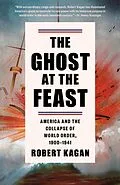AN NPR BEST BOOK OF THE YEAR • A comprehensive, sweeping history of America's rise to global superpower-from the Spanish-American War to World War II-by the acclaimed author of Dangerous Nation
"With extraordinary range and research, Robert Kagan has illuminated America's quest to reconcile its new power with its historical purpose in world order in the early twentieth century." -Dr. Henry Kissinger
At the dawn of the twentieth century, the United States was one of the world's richest, most populous, most technologically advanced nations. It was also a nation divided along numerous fault lines, with conflicting aspirations and concerns pulling it in different directions. And it was a nation unsure about the role it wanted to play in the world, if any. Americans were the beneficiaries of a global order they had no responsibility for maintaining. Many preferred to avoid being drawn into what seemed an ever more competitive, conflictual, and militarized international environment. However, many also were eager to see the United States taking a share of international responsibility, working with others to preserve peace and advance civilization. The story of American foreign policy in the first four decades of the twentieth century is about the effort to do both-"to adjust the nation to its new position without sacrificing the principles developed in the past," as one contemporary put it.
This would prove a difficult task. The collapse of British naval power, combined with the rise of Germany and Japan, suddenly placed the United States in a pivotal position. American military power helped defeat Germany in the First World War, and the peace that followed was significantly shaped by a U.S. president. But Americans recoiled from their deep involvement in world affairs, and for the next two decades, they sat by as fascism and tyranny spread unchecked, ultimately causing the liberal world order to fall apart. America's resulting intervention in the Second World War marked the beginning of a new era, for the United States and for the world.
Brilliant and insightful, The Ghost at the Feast shows both the perils of American withdrawal from the world and the price of international responsibility.
Autorentext
ROBERT KAGAN is a senior fellow at the Brookings Institution and a columnist for The Washington Post. He is also the author of The Return of History and the End of Dreams, Dangerous Nation, Of Paradise and Power, and A Twilight Struggle. He served in the U.S. State Department from 1984 to 1988. He lives in Virginia with his wife.
Klappentext
A comprehensive, sweeping history of America's rise to global superpower--a follow up to the author's acclaimed first volume, from our nation's earliest days to the dawn of the twentieth century.
At the turn of the twentieth century, America was at a tipping point: its population and wealth were growing rapidly, and the country had entered the world stage as a commanding political, economic, and military force. Would America retreat within their own relatively secure and geographically separate borders, or would it continue to expand its influence on an international scale?
Beginning with the "honorable" Spanish American War and ending with the wreckage of World War II, Robert Kagan tracks how America's desire to be an arbiter of peace as a young democracy has conflicted with its desire to stay neutral. Kagan shows how this moral high ground has led to mistakes and acts of ruthless ambition, but he also argues that America's hesitation to intervene in foreign affairs has allowed fascism and tyranny to grow unchecked. Brilliant and insightful, The Ghost at the Feast strips away any illusion that America can be an isolationist country, tracing the stunningly quick dissolution of European control and the emergence of a new world order with America at its helm.
